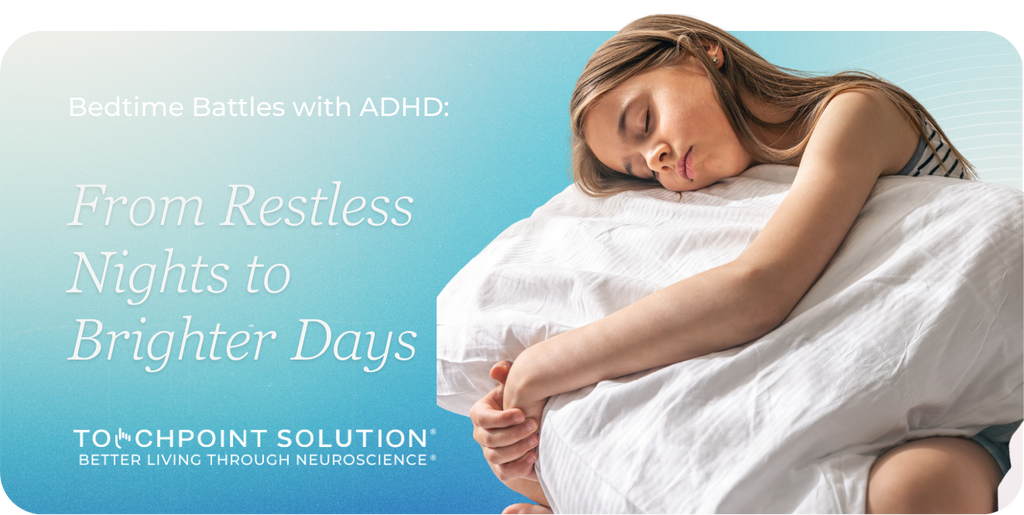Bedtime Battles with ADHD: From Restless Nights to Brighter Days

If your child has ADHD, you may already know how bedtime can feel like the hardest part of the day. Instead of winding down, their minds race through unfinished homework, worries about friendships, or the day ahead. What should be a time of calm often turns into hours of tossing, turning, and anxious thoughts.
Sleep challenges are common for kids with ADHD, and research confirms the link. According to CHADD, children with ADHD are more likely than their peers to experience difficulties falling asleep, staying asleep, and waking up rested. Poor sleep doesn’t just leave them tired—it can also intensify symptoms like impulsivity and inattention while raising anxiety and emotional reactivity. Without enough rest, kids head into the school day more vulnerable to stress, frustration, and even bullying.
How ADHD Disrupts a Good Night’s Sleep
ADHD isn’t just about focus—it also affects how the brain regulates alertness, attention, and the body’s sleep-wake cycle. Without enough sleep, the brain struggles to balance emotions, sustain attention, and manage stress. That can look like:
- Heightened anxiety before or during bedtime
- Difficulty calming down after a busy or overwhelming day
- More frequent emotional outbursts at home or school
- Increased risk of social conflict or bullying, either as a target or as a child acting out
Healthy sleep doesn’t just recharge the body—it builds resilience. It allows kids to reset emotionally, making it easier to face challenges with patience and confidence the next day.
How Parents Can Support Calmer Nights
Parents and caregivers play a vital role in shaping bedtime routines that promote calm and reduce anxiety. Here are some strategies that make a difference:
- Consistent bedtime cues: Establish a predictable wind-down routine (lights dimming, quiet activities, reduced screen time).
- Mindfulness practices: Breathing exercises or short guided meditations help slow racing thoughts.
- Calming tools: Sensory support, like weighted blankets or TouchPoints, can help kids regulate stress before it spirals into bedtime battles.
- Model calm: Children mirror what they see—parents who slow their own pace and demonstrate calm help kids feel safer.
These small steps align with TouchPoint’s Six Dimensions of Health, particularly Mindfulness and Healthy Thinking—teaching children and adults alike how to slow down, reframe worries, and rest with greater ease.
Real Families, Real Results
Families who have integrated calming tools into bedtime routines report meaningful changes. In one TouchPoints™ Case Study, an individual shared how their nightly use of the devices helped them unwind and get deeper, more restful sleep. Some also introduced TouchPoints to their child during moments of bedtime anxiety, helping them settle faster and face the next day with more focus and energy.
Another parent noticed how TouchPoints helped their child during overwhelming moments with schoolwork. By calming anxiety and refocusing, the child was able to redirect their energy into learning rather than shutting down. The same principle applies at night—calming the nervous system helps kids release the day’s stress and prepare for sleep.
These stories reflect what research confirms: when children (and their parents) have practical tools for stress regulation, they experience more restorative sleep and stronger resilience the next day.
See TouchPoint™ Case Studies here.
The Bigger Picture: Resilience Starts at Night
When kids with ADHD get better sleep, they do more than improve their focus. They strengthen their ability to regulate emotions, build healthier peer connections, and reduce the risk of conflict at school. In short, sleep becomes a powerful buffer against the challenges ADHD can bring.
By combining consistent routines, supportive parenting, and stress-regulating tools like TouchPoints, families can turn nighttime struggles into opportunities for resilience.
Give Your Child the Gift of Calmer Nights
Every child deserves to start the day feeling rested and ready. TouchPoints can help make bedtime less overwhelming and mornings more manageable—for both kids and parents.
Explore how TouchPoints can support better sleep and calmer days.
Shop TouchPoints™ Now
-
Posted in
ADHD, Anxiety, Emotional Regulation, Parenting Support, Sleep, stress relief




